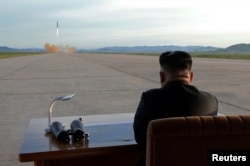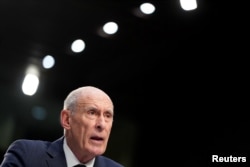A new report by the United Nations shown to the Security Council Friday claims North Korea is working to ensure its weapons cannot be destroyed by military strikes.
It comes as U.S. President Donald Trump hailed "tremendous progress" last week in his dealings with North Korea and set the date for his second summit during Tuesday’s State of the Union address. “As part of a bold new diplomacy, we continue our historic push for peace on the Korean Peninsula,” the president said.
President Trump acknowledged that “much work remains to be done” and set the date for his next meeting with North Korean leader Kim Jong Un for February 27-28 in Vietnam.
South Korea’s presidential office welcomed the news.
“We expect that Vietnam will be the best location to write a new history between North Korea and the USA,” the presidential spokesperson said.
The confidential U.N. report, first disclosed by Reuters news agency on Monday, found evidence of North Korea using civilian facilities, including airports, for ballistic missile assembly and testing with the goal of effectively preventing 'decapitation' strikes."
In addition, the 317-page report said North Korea ”continues to defy Security Council resolutions through a massive increase in illegal ship-to-ship transfers of petroleum products and coal,” rendering the latest U.N. sanctions ineffective.
The U.N. monitors included in the report evidence of one prohibited petroleum transaction worth more than$5.7 million.
The report accused North Korea of also violating a U.N. arms embargo while trying to sell “a wide range of military equipment to armed groups and governments in the Middle East and Africa.”
The report added that Pyongyang was also engaged with small arms and light weapons sales to Libya, Sudan and the Houthi rebels in Yemen.
North Korea also continued a trend in using cyber attacks to “illegally force the transfer of funds from financial institutions and cryptocurrency exchanges” to evade financial sanctions.
The findings supported U.S. intelligence assessments that North Korea is unlikely to scrap its weapons programs.
Last week, U.S. Director of National Intelligence Dan Coats said North Korea views these programs "critical to regime survival."
However, some speculate Pyongyang may offer to scale back its activities to win sanctions relief, but North Korea has said it will never unilaterally give up its nuclear weapons unless the United States first removes any threat to it.
The announcement by U.N. monitors comes ahead of a meeting between U.S. special envoy for North Korea, Stephen Biegun, and his North Korean counterpart in preparation for a second denuclearization summit.
(Lee Ju-hyun contributed to this report.)







